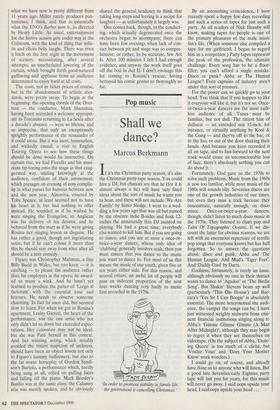Pop music
Shall we dance?
Marcus Berkmann
If it's the Christmas party season, it's also the Christmas party-tape season. You could hire a DJ, but chances are that he (for it is almost always a he) will have very fixed ideas about the sort of music he wants you to hear, and these will not include 'We Are Family' by Sister Sledge. I went to a wed- ding a few years ago that was all but ruined by the obscure indie B-sides and funk 12- inches the unnaturally thin DJ insisted on playing. He had a great time; everybody else wanted to kill him. But if you are going to dance, and you are at most a once-or- twice-a-year dancer, whose only idea of `clubbing' generally involves seals, then you must ensure that you dance to the music you want to dance to. For most of us this means the music of our youth, given five or ten years either side. For this reason, and several others, an awful lot of people will pass an indecent proportion of the next four weeks dancing very badly to music first recorded in the 1970s.
'In order to promote stability in family life, the government is cancelling Christmas.' By an astonishing coincidence, I have recently spent a happy few days recording just such a series of tapes for just such a party. As all readers of Nick Hornby will know, making tapes for people is one of the primary pleasures of the male music fan's life. (When someone else compiled a tape for my girlfriend, I began to regard him as a competitor.) Party tapes represent the peak of the profession, the ultimate challenge. Every song has to be a floor- filler; you can't afford a single mistake. Disco or punk? Abba or The Human League? Even captains of industry aren't under that sort of pressure.
For the power can so quickly go to your head. You think that if you happen to like it everyone will like it, but it's not so. Once- or-twice-a-year dancers are the most ruth- less audience of all. Tunes must be familiar, but not dull. The tiniest hint of dullness — an extended mix 12-inch, for instance, or virtually anything by Kool the Gang — and they're off to the bar, or to the loo, or out of the door shaking their heads. And because you have recorded it all on tape, and to fast-forward to the next track would cause an unconscionable loss of face, there's absolutely nothing you can do about it.
Fortunately, God gave us the 1970s to solve such problems. Music from the 1960s is now too familiar, while most music of the 1980s still sounds silly. Seventies discos are one of the growth industries of our times, but even they miss a trick because they concentrate, naturally enough, on disco music. Once-or-twice-a-year dancers, though, didn't listen to much disco music in the 1970s. They listened to chart pop and Tales Of Topographic Oceans. If we dis- count the latter for obvious reasons, we are left with an enormous repertoire of terrific pop songs that everyone knows but has half forgotten. So to answer the questions above: disco and punk, Abba and The Human League. And Mud's 'Tiger Feet'. And 'Daddy Cool' by Darts.
Coolness, fortunately, is rarely an issue, although obviously no one in their thirties wants to dance to `Agadoo' or 'The Birdie Song'. But Shakin' Stevens bears up well (particularly 'This Ole House') and Bac- cara's 'Yes Sir I Can Boogie' is absolutely essential. The more heterosexual the audi- ence, the camper the songs can be. I have just witnessed weighty stalwarts from emi- nent financial institutions singing along to Abba's 'Gimme Gimme Gimme (A Man After Midnight)', although they may begin to regret it when they see themselves on videotape. (On the subject of Abba, 'Danc- ing Queen' is too much of a cliche, but `Voulez Vous' and 'Does Your Mother Know' work wonders.) I could go on, of course, and already have done so to anyone who will listen. But a good late Seventies/early Eighties party tape will last you for years, for this music will never go away. I said oops upside your head, I said oops upside your head .


















































































 Previous page
Previous page